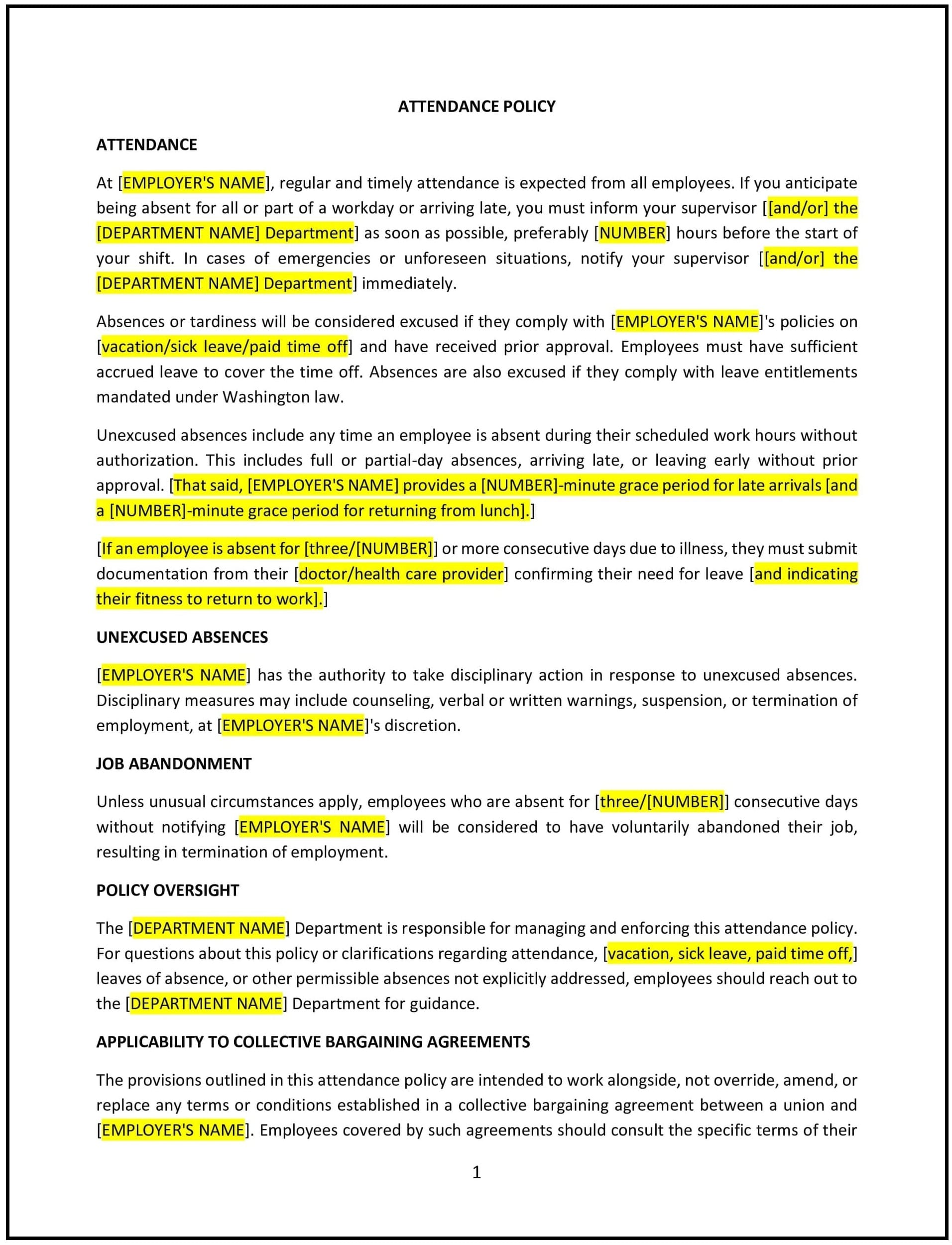Got contracts to review? While you're here for policies, let Cobrief make contract review effortless—start your free review now.

Customize this template for free
This attendance policy is designed to help Washington businesses set clear expectations regarding employee attendance, punctuality, and time-off procedures. The policy outlines the company's approach to managing absenteeism, tardiness, and employee leave, including guidelines for requesting time off, reporting absences, and handling frequent absenteeism. It also specifies the consequences of violating attendance expectations and the company's commitment to ensuring that all employees are treated fairly and consistently.
By adopting this policy, businesses can promote a productive and accountable work environment while maintaining a balance between company needs and employee well-being.
How to use this attendance policy (Washington)
- Define attendance expectations: Clearly outline the company’s expectations for employee attendance, including the required work hours, punctuality, and any flexibility that may be offered. The policy should specify the importance of regular attendance for maintaining productivity and meeting company goals.
- Establish a process for requesting time off: Employees should know how to request time off, including advance notice requirements, the process for submitting leave requests, and any required documentation, such as a doctor’s note for sick leave. The policy should clarify whether time-off requests are granted based on business needs and availability.
- Specify acceptable reasons for absence: The policy should list acceptable reasons for employee absences, such as illness, personal matters, or family emergencies, and explain how to report such absences. The company may also specify procedures for handling scheduled leaves, such as vacation, medical leave, or bereavement leave.
- Address tardiness and unplanned absences: The policy should define the process for reporting tardiness and unplanned absences, including the need for employees to inform their manager or HR as soon as possible. The policy should also outline the consequences of frequent tardiness or unexcused absences.
- Set guidelines for leave of absence: Outline the company's approach to long-term leave, including unpaid leave, medical leave, or any other type of leave available under Washington state or federal law (e.g., Family and Medical Leave Act). The policy should define how leave is requested and how it will be managed.
- Define consequences for excessive absenteeism: The policy should specify the consequences for employees who fail to adhere to attendance expectations, including progressive disciplinary actions, such as verbal warnings, written warnings, suspension, or termination.
- Ensure compliance with Washington and federal laws: The policy must comply with Washington state laws and federal regulations, including the Washington Family Leave Act (FLA), the federal Family and Medical Leave Act (FMLA), and any applicable workers' compensation laws.
- Review and update regularly: Periodically review and update the policy to ensure it remains compliant with Washington state laws, federal regulations, and any changes in the company’s operations or workplace culture.
Benefits of using this attendance policy (Washington)
This policy offers several benefits for Washington businesses:
- Promotes accountability: By clearly defining attendance expectations, businesses can promote employee accountability, ensuring that employees are committed to being present and on time for work.
- Reduces absenteeism and tardiness: A well-defined attendance policy helps reduce absenteeism and tardiness by providing employees with clear guidelines on how to request time off and the consequences of not adhering to attendance expectations.
- Improves productivity: When employees are present and punctual, it helps maintain smooth operations, increases productivity, and reduces disruptions caused by absenteeism.
- Enhances employee fairness: The policy ensures that all employees are treated fairly and consistently when it comes to attendance. It also provides guidelines for addressing issues like unplanned absences or excessive tardiness in a way that is transparent and reasonable.
- Supports legal compliance: The policy supports compliance with Washington state laws, federal regulations, and other applicable legal requirements regarding employee attendance, leave, and rights to time off.
- Strengthens company culture: A clear and fair attendance policy fosters a positive company culture by ensuring that employees understand their role in maintaining business operations while respecting the company’s needs.
Tips for using this attendance policy (Washington)
- Communicate the policy clearly: Ensure that all employees are aware of the attendance policy and understand the company’s expectations for attendance, tardiness, and time off. Include the policy in the employee handbook and review it during onboarding or at regular meetings.
- Be consistent in applying the policy: The policy should be applied consistently to all employees. Make sure that attendance issues are handled fairly and that disciplinary actions are proportional to the severity of the violation.
- Encourage timely reporting of absences: Employees should report absences or tardiness as soon as possible, ideally before the start of their shift. Ensure that the reporting process is clear and that employees understand how and when to notify their manager or HR.
- Consider flexible work arrangements: If possible, consider offering flexible work arrangements (e.g., telecommuting or flexible hours) to help employees manage personal obligations while maintaining attendance standards. The policy should address any flexibility offered and how it will be managed.
- Track attendance accurately: Maintain accurate records of attendance, including sick days, vacation time, and any other leave taken by employees. This will help prevent confusion and ensure that time-off policies are applied consistently.
- Review and update regularly: Periodically review the policy to ensure it remains compliant with Washington state laws, federal regulations, and any changes in the company’s operations or workplace culture. Regular updates will help keep the policy relevant and effective.